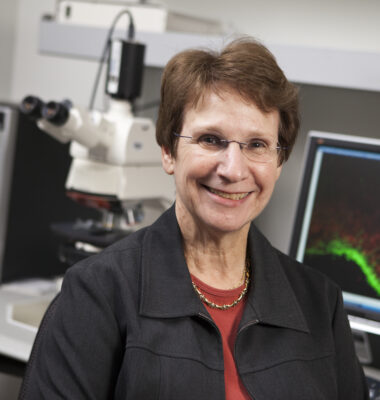
Joanne Weinberg
PhD (Stanford University School of Medicine)
MAT (Harvard University Graduate School of Education)
BA (Brown University)
Professor Emerita, Department of Cellular & Physiological Sciences, Faculty of Medicine, UBC
Distinguished University Scholar
Full Member
Dr. Joanne Weinberg is a Professor Emerita and Distinguished University Scholar in the Department of Cellular & Physiological Sciences at the University of British Columbia. She is a member of the Djavad Mowafaghian Centre for Brain Health, and an Associate Member of the Department of Psychology and the Child and Family Research Institute.
Research in the Weinberg laboratory focuses on the investigation of how early life experiences, particularly, prenatal exposure to alcohol and stress, alter brain and biological development. Overall, we are interested in how interactions between psychosocial and physiological events occurring early in development can produce long-term changes in hormonal, immune and behavioral function, and significantly alter vulnerability or increase resilience to diseases and disorders later in life.
Contact Info
Research Information
Research in the Weinberg Lab focuses on prenatal alcohol exposure (PAE), stress, and neuroendocrine-neuroimmune regulation, with a specific focus on mechanisms underlying prenatal alcohol effects on fetal programming of neurobiological systems. Her studies have demonstrated that alcohol, in addition to its teratogenic effects, is an early life insult that programs developing systems and markedly increases risk for diseases/disorders throughout life, the “Developmental Origins of Health and Disease” (DOHaD) concept. Dr. Weinberg has developed rodent models to examine brain-behavior relationships from prenatal life through adulthood, utilizing a broad multidisciplinary approach to tackle problems from the molecular to the behavioral level. She has also collaborated actively with clinical researchers to extend her expertise on stress, programming and development to human populations. Her animal model studies have shown that PAE results in hyperresponsiveness to stressors, and marked changes in central regulation of hypothalamic-pituitary-adrenal (HPA) or stress axis activity under both basal and stress conditions. Utilizing an animal model of adjuvant-induced arthritis, data have also demonstrated marked ethanol-induced alterations in neuroimmune function, particularly in response to immune challenges and stress.
For the past 10 years, Dr. Weinberg has been part of the NIH/NIAAA Collaborative Initiative on FASD, providing the opportunity to translate research on animal models of PAE to cohorts of pregnant women and their children. This research is the first to identify a link between maternal alcohol consumption, inflammation, and child outcomes: Unique immune signatures in pregnant women were identified in association with whether or not they consumed alcohol and with the neurodevelopmental outcomes (typically developing/developmentally delayed) of their children. Similarly, immune profiles of the children were shown to reflect both alcohol exposure and neurodevelopmental status.
Dr. Weinberg’s research has been funded over the years by the BC Health Research Foundation, MRC/CIHR, Coast Capital Savings Depression Research Fund, the Canadian Foundation on Fetal Alcohol Research, and since 1988, by NIH/ NIAAA. Since 2009, she has held a MERIT Award.
Publications